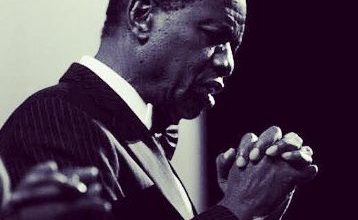DCLM Search The Scripture 13 February 2022: The Birth Of Isaac, Heir Of Promise


Deeper Christian Life Ministry – Search The Scripture 13 February 2022 (Volume One Lesson Seven)
Click HERE for Previous MESSAGES by Pastor Kumuyi
Topic: The Birth Of Isaac, Heir Of Promise (STS 13 February 2022)
MEMORY VERSE: “And the LORD visited Sarah as he had said, and the LORD did unto Sarah as he had spoken. For Sarah conceived, and bare Abraham a son in his old age, at the set time of which God had spoken to him” (Genesis 21:1,2).
TEXT: Genesis 21:1-34 (KJV)
1 And the Lord visited Sarah as he had said, and the Lord did unto Sarah as he had spoken.
2 For Sarah conceived, and bare Abraham a son in his old age, at the set time of which God had spoken to him.
3 And Abraham called the name of his son that was born unto him, whom Sarah bare to him, Isaac.
4 And Abraham circumcised his son Isaac being eight days old, as God had commanded him.
5 And Abraham was an hundred years old, when his son Isaac was born unto him.
6 And Sarah said, God hath made me to laugh, so that all that hear will laugh with me.
7 And she said, Who would have said unto Abraham, that Sarah should have given children suck? for I have born him a son in his old age.
8 And the child grew, and was weaned: and Abraham made a great feast the same day that Isaac was weaned.
9 And Sarah saw the son of Hagar the Egyptian, which she had born unto Abraham, mocking.
10 Wherefore she said unto Abraham, Cast out this bondwoman and her son: for the son of this bondwoman shall not be heir with my son, even with Isaac.
11 And the thing was very grievous in Abraham’s sight because of his son.
12 And God said unto Abraham, Let it not be grievous in thy sight because of the lad, and because of thy bondwoman; in all that Sarah hath said unto thee, hearken unto her voice; for in Isaac shall thy seed be called.
13 And also of the son of the bondwoman will I make a nation, because he is thy seed.
14 And Abraham rose up early in the morning, and took bread, and a bottle of water, and gave it unto Hagar, putting it on her shoulder, and the child, and sent her away: and she departed, and wandered in the wilderness of Beersheba.
15 And the water was spent in the bottle, and she cast the child under one of the shrubs.
16 And she went, and sat her down over against him a good way off, as it were a bow shot: for she said, Let me not see the death of the child. And she sat over against him, and lift up her voice, and wept.
17 And God heard the voice of the lad; and the angel of God called to Hagar out of heaven, and said unto her, What aileth thee, Hagar? fear not; for God hath heard the voice of the lad where he is.
18 Arise, lift up the lad, and hold him in thine hand; for I will make him a great nation.
19 And God opened her eyes, and she saw a well of water; and she went, and filled the bottle with water, and gave the lad drink.
20 And God was with the lad; and he grew, and dwelt in the wilderness, and became an archer.
21 And he dwelt in the wilderness of Paran: and his mother took him a wife out of the land of Egypt.
22 And it came to pass at that time, that Abimelech and Phichol the chief captain of his host spake unto Abraham, saying, God is with thee in all that thou doest:
23 Now therefore swear unto me here by God that thou wilt not deal falsely with me, nor with my son, nor with my son’s son: but according to the kindness that I have done unto thee, thou shalt do unto me, and to the land wherein thou hast sojourned.
24 And Abraham said, I will swear.
25 And Abraham reproved Abimelech because of a well of water, which Abimelech’s servants had violently taken away.
26 And Abimelech said, I wot not who hath done this thing; neither didst thou tell me, neither yet heard I of it, but to day.
27 And Abraham took sheep and oxen, and gave them unto Abimelech; and both of them made a covenant.
28 And Abraham set seven ewe lambs of the flock by themselves.
29 And Abimelech said unto Abraham, What mean these seven ewe lambs which thou hast set by themselves?
30 And he said, For these seven ewe lambs shalt thou take of my hand, that they may be a witness unto me, that I have digged this well.
31 Wherefore he called that place Beersheba; because there they sware both of them.
32 Thus they made a covenant at Beersheba: then Abimelech rose up, and Phichol the chief captain of his host, and they returned into the land of the Philistines.
33 And Abraham planted a grove in Beersheba, and called there on the name of the Lord, the everlasting God.
34 And Abraham sojourned in the Philistines’ land many days.
MESSAGE:
God called Abraham for the purpose of being a channel of blessing to the whole world. In the call, He promised that “in thee shall all families of the earth be blessed” (Genesis 12:3). God planned to raise through Abraham, a nation that would know and keep His ways. From his family would come forth a chosen people through whom Jesus Christ, the promised Seed of the woman would emerge (Genesis 3:15; Galatians 3:8, 16,18).
To fulfil God’s promise, Abraham needed to have a son. But Sarah, his wife, was barren for more than twenty years. At a point, Abraham seemed to have lost hope about the fulfilment of the promise. “And Abram said, Behold, to me thou hast given no seed: and, 10, one born in my house is mine heir” (Genesis 15:3). He was in doubt whether the seed God had promised should be a son of his loins or a son in his house. But the Lord cleared his doubt and assured him that the heir to his house would come (Genesis 15:4). In spite of this assurance, Abraham accepted Sarah’s suggestion to take Hagar, their Egyptian handmaid, and go in to her (Genesis 16:1-3).
Abraham fell into the temptation and its consequences still remain with us today. It takes a resolute faith and strong conviction to know when a suggestion is from an enemy and to reject it. Children of God should be wary of ungodly counsels, pressures from parents or friends and stand resolutely with the word of God. They should wait patiently for the Lord to fulfil the promises He has made to them. The text under consideration shows that, no matter how long it takes for God to fulfil His promise, in due time, it will come. “For when God made promise to Abraham, because he could swear by no greater, he sware by himself, And so, after he had patiently endured, he obtained the promise” (Hebrews 6: 13, 15). God’s promises are true and reliable, regardless of any opposing circumstances.
BIRTH OF ISAAC IN FULFILMENT OF GOD’S PROMISE (Genesis 21:1-8; 17:17; 18:10-14; Romans 4:19-21; 2 Corinthians 1:20; Luke 1:37)
Isaac was the promised heir born to Abraham and Sarah when they were very old in fulfilment of God’s promise. Abraham was 100 years old while Sarah was 90 years. “And the LORD visited Sarah as he had said, and the LORD did unto Sarah as he had spoken” (Genesis 21:1). Once God has promised, He will surely fulfil it, no matter the delay. It is often said that “God’s delays are His appointments”. Therefore, believers should see delays in getting married, childbearing, securing a dream employment, financial breakthrough and healing, among others, as stepping stones to wonderful testimonies that would bring glory to God. Abraham named his child whom Sarah bore to him Isaac, meaning laughter because “…God hath made me to laugh, so that all that hear will laugh with me” (Genesis 21:6), said Sarah. Though the couple had laughed as a result of doubt, God, at last had turned their laughter of doubt to joy (Psalm 126:1-3; Job 8:20,21). Christians should always rest upon God’s promises and not be swayed by contrary opinions of men.
The New Testament made reference to the faith of Abraham, who “…being not weak in faith, he considered not his own body now dead, when he was about an hundred years old, neither yet the deadness of Sarah’s womb: He staggered not at the promise of God through unbelief; but was strong in faith, giving glory to God; And being fully persuaded that, what he had promised, he was able also to perform” (Romans 4:19-21). In line with his covenant with God, Abraham circumcised Isaac on the eighth day. Flesh circumcision was a token of the Abrahamic covenant. No matter how difficult and painful to the flesh, believers should learn to obey God.
THE BONDWOMAN AND HER SON SENT AWAY (Genesis 21:9-21; 25:1-3,5,6; Galatians 4:22,23,25,28-30; Mark 12:6-9)
Ishmael, Abraham’s first son through Hagar, was fourteen years older than Isaac (Genesis 16: 16) and the only heir apparent until Isaac came. After Isaac was weaned, probably at age three according to Jewish culture, “…Sarah saw the son of Hagar the Egyptian, which she had born unto Abraham, mocking. Wherefore she said unto Abraham, Cast out this bondwoman and her son: for the son of this bondwoman shall not be heir with my son, even with Isaac” (Genesis 21:9, 10). Sarah’s stance at this time must not be mistaken for the cruel jealousy of a woman who did not want a rival. The point is, Ishmael was persecuting Isaac, the child of promise; and that amounted to an opposition to the covenant God made with Abraharn. The New Testarnent sheds light on this in Galatians 4:22-30. “And the thing was very grievous in Abraham’s sight because of his son.
And God said unto Abraham, Let it not be grievous in thy sight because of the lad; and because of thy bondwoman; in all that Sarah hath said unto thee, hearken unto her voice; for in Isaac shall thy seed be called” (Genesis 21:11, 12). God sanctioned Sarah’s demand to send Hagar and her son away, though it was grievous in Abraham’s sight. Ishmael was sent away in order to fulfil the promise God made concerning Isaac: “…for in Isaac shall thy seed be called” (Genesis 21:12). Abraham obeyed the Lord speedily and sent them away with provisions for their journey, as much as they would need, until they reached the next well or oasis. Believers should learn from Abraham’s attitude of prompt obedience to God’s command (Genesis 21:14; 22:3). As Hagar and Ishmael travelled, the water they took got exhausted, Ishmael fainted under the hot desert sun and Hagar abandoned him in despair. But “God heard the voice of the lad; and the angel of God called to Hagar out of heaven, and said unto her, What aileth thee, Hagar? fear not; for God hath heard the voice of the lad where he is” (Genesis 21:17). The Lord is benevolent towards all the inhabitants on the face of the earth. Despite the fact that Ishmael was born outside the divine covenant God made with Abraham, He still took care of him. This shows that God cares for all His creatures on earth, especially man that was created in His image.
Moreover, He is not willing that any should perish but that all should come to repentance (2 Peter 3:9). Christ died for the whole world; and all that come to God through Him will be saved. Hagar was ignorant of God’s care and concern for her and the young lad. While she despaired and hoped that they would both die of hunger and thirst, “God opened her eyes, and she saw a well of water; and she went, and filled the bottle with water, and gave the lad drink’ (Genesis 21:19). The Lord was with them and protected them from all dangers in the wilderness. There is always solution to man’s problem no matter the condition and situation we find ourselves.
BEERSHEBA COVENANT BETWEEN ABRAHAM AND ABIMELECH (Genesis 21:22-34; Psalm 86: 17; Hebrews 12:14; Matthew 18:15)
“And it came to pass at that time, that Abimelech and Phichol the chief captain of his host spake unto Abraham, saying, God is with thee in all that thou doest” (Genesis 21:22). Abraham’s favoured disposition is traceable to his decision to forsake the idols of his fathers and cleave to the God of heaven whom he had served with deep devotion. The testimony of Abimelech and Phichol is a confirmation of God’s promise to protect preserve and defend him wherever he went. “And I bless them that bless thee, and curse him that curseth thee: and in thee shall all families of the earth be blessed” (Genesis 12:3). It is no wonder that even the heathen perceived the divine presence with him. There are important lessons from the covenant between Abimelech and Abraham.
One, it was a reflection of God’s favour. God sometimes shows His people tokens for good that their neighbours cannot but take notice of (Psalm 86:17). Two, it is good to be in favour with those that are in favour with God. “…We will go with you, for we have heard that God is with you” (Zechariah 8:23). We do well for ourselves if we have fellowship with those that have fellowship with God. Abraham and Abimelech proposed that there should be a firm and constant friendship between the two families, which should not be violated. This bond of friendship must be strengthened by the bond of an oath, in which God was appealed to, both as a witness of their sincerity and an avenger in case either side were treacherous (Genesis 21:23). Three, Abimelech requested that the covenant should extend to his people and posterity. Good men should secure alliance and communion with the favourites of heaven, not for themselves only.
Abraham was ready to enter into a covenant with Abimelech after finding him to be a man of honour, good conscience and one who fears God (Genesis 21:24). It is however necessary to note that New Testament believers are to be careful of going into covenant relationships with others to avoid unequal yoke. Abraham prudently settled the matter concerning the well about which Abimelech’s servants had quarrelled with him (Genesis 21:25). What an instructive lesson to believers that when our brother trespasses against us, we should settle the rift with meekness of wisdom (Matthew 18:15). Abraham accepted Abimelech’s exoneration of himself in this matter: “…1 wot not who hath done this thing” (Genesis 21:26). Many are wrongly suspected of injustice and unkindness who were innocent of the act, and we ought to accept when they clear themselves.
The faults of servants should not be imputed to their masters unless they know and justify them. Satan-motivated misunderstanding among brethren can be settled with love and humility. When a similar event happened between Abraham and Lot his brother, he settled it with maturity devoid of covetousness (Genesis 13:7-9). The strife that would have probably ended in battle against each other turned to a covenant relationship that brought joy to their generations. God calls us to “Follow peace with all men, and holiness, without which no man shall see the Lord” (Hebrews 12:14).
Abraham took care to have his title to the well cleared and confirmed to prevent any disputes or quarrels in the future. He presented to Abimelech that which was valuable and useful — sheep and oxen — in gratitude for his kindness and hospitality as a token of a hearty friendship (Genesis 21:27). Eventually, they ratified the covenant by an oath and registered it by giving a new name to the place — Beersheba, the well of the oath — in remembrance of the covenant (Genesis 21 :31). Believers should always remember that they are in covenant relationship with God. Being conscious of this, they should live soberly, righteously and godly in this present world.
Questions for review:
- What should be a believer’s attitude to different suggestions in time of pressing needs and problems?
- What can a Christian learn from the fulfilment of the promised son to Abraham?
- Why was it necessary for Abraham to send Hagar and Ishmael away?
- What can we learn from Abraham’s obedience to the Lord though it was grievous?
- What should be our role as brethren in the church when there is strife or misunderstanding?
- What can we learn from Abraham’s attitude of peaceful co-existence?
- What can believers learn from the covenant between Abraham and Abimelech?
Flatimes’ Notice Board: Until you are born again, God ever abiding presence will never be with you. You must be born again to enjoy continuous victory. Please say the displayed prayer below in faith:
Lord Jesus, come into my life. I accept You as my Lord and Personal Saviour. I believe in my heart You died and rose from the dead to save me. Thank You Lord for saving me, in Jesus name Amen.
If you just prayed the prayer of salvation online please send your testimonies and prayer request to HELP LINES: +234(8157991934, 8157991936, 8157991937) E-MAIL: [email protected]





